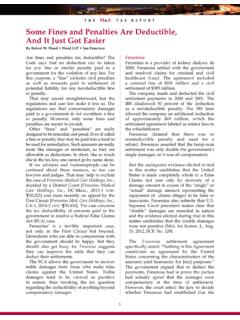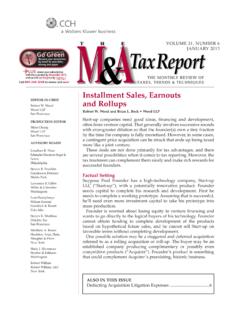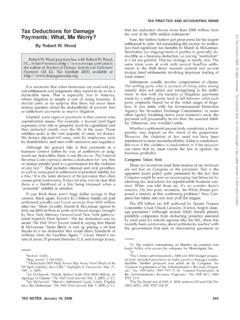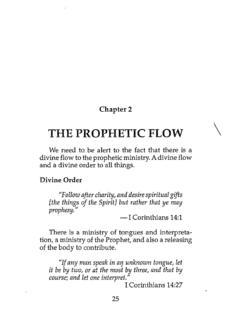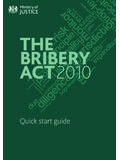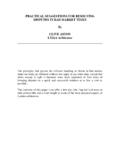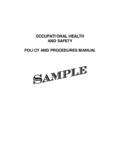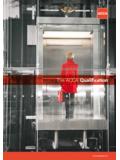Transcription of IRS Form 1099: Ten Things Every Lawyer Should …
1 Page 14 February 2012By Robert W. WoodEveryone receives IRS Forms 1099 Every year. Th ese little forms report interest, dividends, real estate sales proceeds, consulting income, retirement plan distributions, tax refunds, and many other categories of income. Th ey are a major source of information for the IRS. Copies go to state tax authorities too and they are equally useful in collecting state tax revenues. In fact, these little forms represent the keys to the kingdom, allowing matching of taxpayer identifi cation numbers and dollar amounts. Th at means there is a stark certainty about them. If you receive a Form 1099 report-ing income but fail to put it on your tax return, you will almost certainly receive a tax notice (or worse). Because Forms 1099 allow computer matching of Social Security numbers and dollar amounts, the forms have a decided impact on tax compliance and collec-tions. IRS statistics prove this. When a taxpayer receive one of these forms he or she is much more likely to report the pay-ment on a tax return.
2 Th e forms also encourage effi ciency in tax collections. IRS collection eff orts can be streamlined, even mechanized. It takes no eff ort for the IRS to spew out a bill to a taxpayer who fails to include a payment reported on a Form 1099. Forms 1099 Should never be ignored and Should be opened promptly. Th ere are many more Forms 1099 today than ever before. Th at means there are also more errors. Many errors can be cor-rected if you act promptly, so open them upon receipt. Do not wait until you start to do your taxes. Kill All the lawyers ? lawyers receive and send more Forms 1099 than most people, in part due to tax laws that single them out. Several decades ago the IRS initiated a program called Project Esquire, which implicitly recognized that lawyers needed particular tax Th is program was long ago suspended. Nevertheless, some at the IRS still believe lawyers deserve special audits. A recent IRS audit guide instructs IRS agents what to look for when auditing lawyers make good audit subjects because they oft en handle client funds.
3 Th ey also tend to have signifi cant income. Independently, the IRS has long had an interest in the tax treatment of litigation settlements, judgments and attorney fees. Th ese concerns coalesce nicely in report-ing issues over attorney fees. For this rea-son, it Should be no surprise that lawyers are singled out for extra Forms 1099. Following a tradition of naming tax legislation with euphemisms, Congress included a host of tough tax laws in the ironically named Taxpayer Relief Act of 1997. One provision that captivated attorneys was a seemingly innocuous reporting rule now enshrined in Section 6045(f) of the tax code. Th at provision requires companies making payments to attorneys for services to report the pay-ments to the IRS on a Form 1099. On its face, this may not seem like an important provision in the tax law. Aft er all, regardless of whether they receive Forms 1099, lawyers Should report all their fee income. Yet this rule has a signif-icant impact on lawyers as recipients and as issuers of Forms 1099.
4 lawyers and law fi rms send as well as receive fact, these little slips of paper have become ubiquitous in law practice, and their relevance is not confi ned to once a year at tax time. Even for lawyers who have an accountant or bookkeeper to keep them straight, any Lawyer in private practice whether in a large fi rm, small fi rm or solo practice Should know key facts about them. In-house lawyers who deal with settlements of suits against their company also need to know the basics of Form 1099 rules. Here are ten Things Every Lawyer Should know:1. $600 or More Th e basic reporting rule is that each person engaged in business and making a payment of $600 or more for services must report it on a Form 1099. Th e rule is cumulative, so while one payment of $500 would not trigger the rule, two payments of $500 to a single payee during the year require a Form 1099 for the full $1,000. lawyers must issue Forms 1099 to expert witnesses, jury consultants, investigators and even co-counsel where services are performed and the payment is $600 or more.
5 A notable exception from the normal $600 rule is payments to corporations. Payments made to a corporation for services are generally exempt. But see rule 2 Incorporated lawyers Although payments to corporations are 1 The IRS undertook Project Esquire during the 1990s to identify attorneys who failed to fi le federal income tax returns. Although most were given the opportunity to pay their taxes, some were criminally indicted. See Attorney Nonfi lers Still Targets in Service s Project Esquire, 95 TNT 52-7 (Mar. 16, 1995). 2 See Robert W. Wood, What Every Lawyer Should Know About IRS Audits, Vol. 83, No. 8, New York State Bar Association Journal (Oct. 2011), p. 36; see also IRS Attorneys Audit Technique Guide (March 2011), available at ,,id=241098, Story | Tax LawTen Things Every Lawyer Should knowIRS FORM10991099, Page 15 Page Story | Tax Lawexempt from 1099 rules, an exception applies to payments for legal services. Put another way, the rule that payments to lawyers must be the subject of a Form 1099 trumps the rule that payments to corporation need not be.
6 Th us, any pay-ment for services of $600 or more to a Lawyer or law fi rm must be the subject of a Form 1099. It does not matter if the law fi rm is a corporation, LLC, LLP or general partnership. It also does not matter how large or small the law fi rm. Th is impacts law fi rms as issuers of Forms 1099 as well as receiving them. A Lawyer or law fi rm paying fees to co-counsel or a referral fee to a Lawyer must issue a Form 1099 regardless of how the Lawyer or law fi rm is organized. Moreover, any client paying a law fi rm more than $600 in a year as part of the client s business must issue a Form 1099. 3. Forms 1099 are generally issued in January of the year aft er payment. Th ey must be dispatched to the taxpayer by the last day of January. Th e IRS copies are not due at the IRS until the end of February (along with a transmittal form summariz-ing the data). For that reason, aft er sending the forms to payees, most businesses wait a few weeks before sending the required copies to the IRS.
7 In part, this is to allow for corrections. If someone receives a Form 1099 and promptly complains to the issuer, the correction can readily be made without needing to fi le multiple Forms with the IRS to correct the businesses and law fi rms prefer to issue Forms 1099 at the time they issue checks. Th is practice is perfectly lawful and seems to be growing in popularity. Example: Suits-R-Us, LLP is disburs-ing $1,500 each to thousands of plaintiff s in a consumer class action. Seeking to economize and only prepare one mail-ing to class members, the fi rm issues the checks and Forms 1099 to class members simultaneously. In February of the fol-lowing year it will transmit all the Forms 1099 and summary data to the IRS. 4. Forms 1099 to Clients? One of the most confusing tax report-ing issues for law fi rms is whether the law fi rm Should issue Forms 1099 to clients. Practice varies considerably, and many fi rms issue the forms However, most payments to clients do not require the forms.
8 Settlement Checks to Clients? Many lawyers receive funds which they pass along to their clients. Th ere is rarely a Form 1099 obligation for such payments. Most lawyers receiving a joint settlement check to resolve a client lawsuit are not considered payors. Th e settling defendant is considered the payor, so it has the obli-gation to issue the forms, not the Lawyer . Example 1: Larry Lawyer earns a contingent fee by helping Cathy Client sue her bank. Th e settlement check is payable jointly to Larry and Cathy. If the bank doesn t know the Larry/Cathy split, it must issue two Forms 1099, to both Larry and Cathy, each for the full amount. When Larry cuts Cathy a check for her share, he need not issue a 2: Consider the same facts as in Example 1. However, suppose that Larry tells the bank to issue two checks, one to Larry for 40%, and the other to Cathy for 60%. Here again Larry has no obligation to issue a form, be-cause Cathy is getting paid by the bank. Th e bank will issue Larry a Form 1099 for his 40%.
9 It will issue Cathy a Form 1099 for 100%, including the payment to Larry even though the bank paid Larry directly. Cathy will have to fi nd a way to deduct the legal fee. Personal Physical Injury Payments. One of the many exceptions to the rules for Forms 1099 applies to payments for personal physical injuries or sickness. Because such payments are tax-free to the injured person, no Form 1099 is required. Example 1: Hal Hurt is in a car crash and receives a $1 million settlement. Defendant Motors issues a joint check to Hal and his Lawyer Sue Suits. Defendant is not required to issue a Form 1099 to Hal. Defendant must still issue a Form 1099 to Sue for the full $1 million. Example 2: Same facts but this time Sue asks for a $600,000 check issued to Hal (no Form 1099) and a $400,000 check issued to her (Form 1099 to Sue for $400,000).Other Payments to Clients. Refunds of legal fees to clients raise another issue. If the refund is of monies held in the Lawyer s trust account, no Form 1099 is required.
10 However, if the law fi rm was previously paid and is refunding an amount from the law fi rm s own income, a Form 1099 is : Big Law LLP repre-sents Joe Inventor and is holding $50,000 of Joe s funds in its trust account. Due to a dispute over the quality of Big Law s services, it agrees to refund $30,000 of Joe s deposit. No Form 1099 is required, since this was Joe s money. Big Law also agrees to refund $60,000 of the monies Joe paid for fees over the last three years. Big Law is required to issue a Form 1099 for the $60, Oversight and Management? Th e primary area where lawyers must issue the forms to clients is if the Lawyer performs signifi cant oversight and man-agement functions. What if the Lawyer is not merely receiving the money and dividing the Lawyer s and client s shares? Under IRS regulations, if lawyers take on too big a role and exercise management and oversight of client monies, they be-come payors. As such, they are required to issue Forms 1099 when they disburse funds.




